Submitted:
30 August 2023
Posted:
31 August 2023
You are already at the latest version
Abstract
Keywords:
1. Introduction
2. Data and Methods
2.1. Data
2.2. Methods
3. Results and Discussion
3.1. MCSs occurrence along the coast during JJAS
3.2. Spreading and daily convective activity of MCSs along the coast
3.3. Relationship between MCSs and extreme rainfall along the coast of the Gulf of Guinea
3.4. Overview of atmospheric circulation and oceanic conditions
4. Conclusions
Author Contributions
Funding
Data Availability Statement
Acknowledgments
Conflicts of Interest
Appendix A
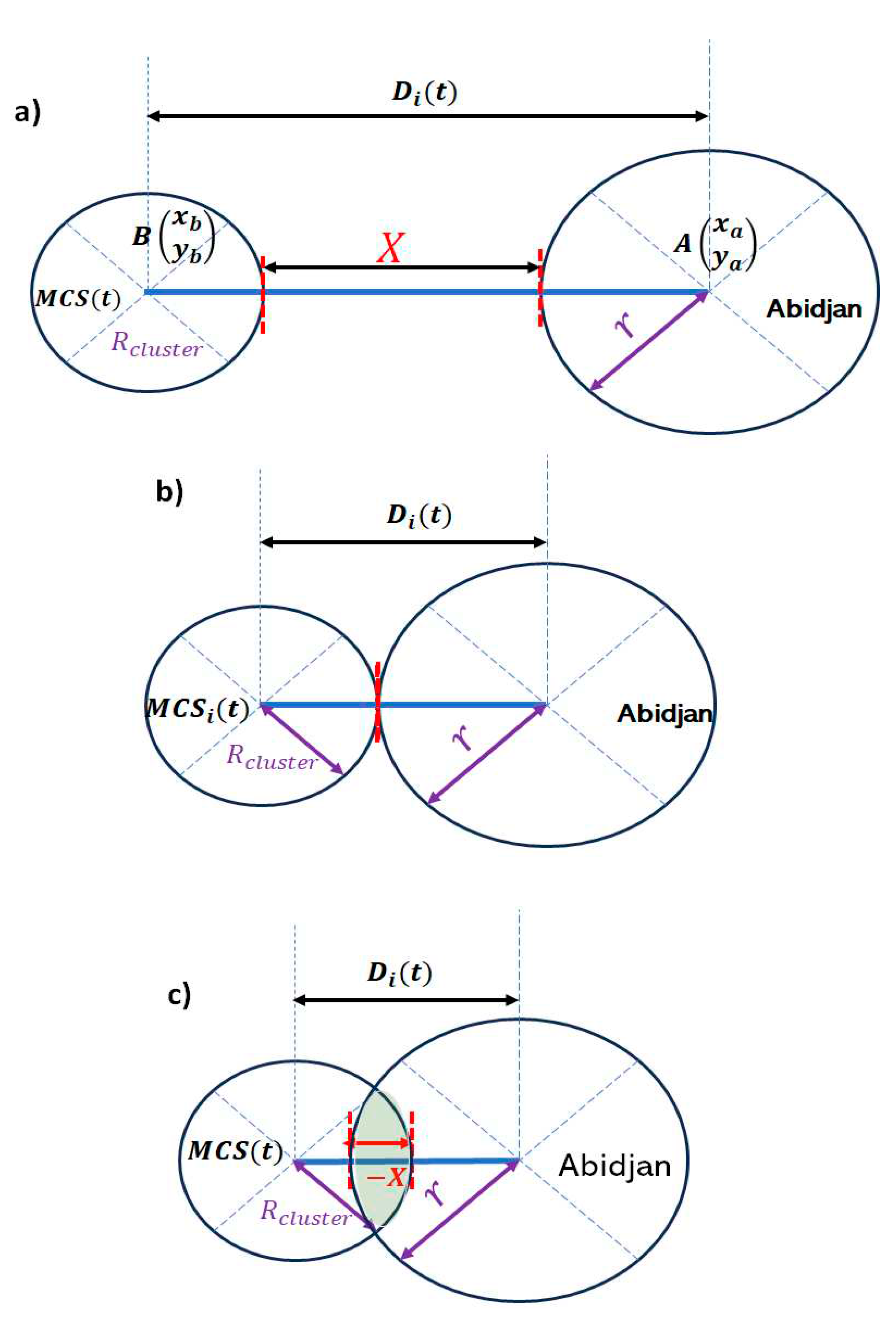
References
- Tomasini, M.; Lafore, J.P.; Piriou, C.; Roca, R.; Ramage, K.; Laurent, H.; Morel, C.; Senesi, S. Atlas on a Climatology of West African Mesoscale Convective Systems. AMMA European Deliverable 2006. [Google Scholar]
- Mathon, V.; Laurent, H.; Lebel, T. Mesoscale Convective System Rainfall in the Sahel. J. Appl. Meteor. 2002, 41, 1081–1092. [Google Scholar] [CrossRef]
- Ta, S.; Kouadio, K.Y.; Ali, K.E.; Toualy, E.; Aman, A.; Yoroba, F. West Africa Extreme Rainfall Events and Large-Scale Ocean Surface and Atmospheric Conditions in the Tropical Atlantic. Advances in Meteorology 2016, 2016, 1–14. [Google Scholar] [CrossRef]
- Lafore, J.-P.; Beucher, F.; Peyrillé, P.; Diongue-Niang, A.; Chapelon, N.; Bouniol, D.; Caniaux, G.; Favot, F.; Ferry, F.; Guichard, F.; et al. A Multi-Scale Analysis of the Extreme Rain Event of Ouagadougou in 2009: Extreme Rain Event in Burkina Faso. Q.J.R. Meteorol. Soc 2017, 143, 3094–3109. [Google Scholar] [CrossRef]
- Kouadio, Y.K.; Ochou, D.A.; Servain, J. Tropical Atlantic and Rainfall Variability in Côte d’Ivoire. Geophys. Res. Lett. 2003, 30, n. [Google Scholar] [CrossRef]
- Kouadio, K.Y.; Aman, A.; Ochou, A.D.; Ali, K.E.; Assamoi, P.A. Rainfall Variability Patterns in West Africa: Case of Cote d’Ivoire and Ghana. Journal of Environmental Science and Engineering 2011, 5. [Google Scholar]
- Damania, R.; Desbureaux, S.; Zaveri, E. Does Rainfall Matter for Economic Growth? Evidence from Global Sub-National Data (1990-2014).
- Santé; N’Go; Soro; Meledje; Bi Characterization of Meteorological Droughts Occurrences in Côte d’Ivoire: Case of the Sassandra Watershed. Climate 2019, 7, 60. [CrossRef]
- Konate, D.; Didi, S.R.; Dje, K.B.; Diedhiou, A.; Kouassi, K.L.; Kamagate, B.; Paturel, J.-E.; Coulibaly, H.S.J.-P.; Kouadio, C.A.K.; Coulibaly, T.J.H. Observed Changes in Rainfall and Characteristics of Extreme Events in Côte d’Ivoire (West Africa). Hydrology 2023, 10, 104. [Google Scholar] [CrossRef]
- Ochou, A.D.; Aman, A.; Kouadio, K.Y.; Assamoi, P. Nouveau Zonage Climatique Basé Sur La Variabilité Pluviométrique En Côte d’Ivoire et Au Ghana. Geotrope 2005, 5, 34–46. [Google Scholar]
- Amouin, J.; Kouadio, K.Y.; Kacou, M.; Djakouré, S.; Ta, S. Diagnosis of the Causes of the Rain Flooding in June in the West Africa Coastal Area. ACS 2021, 11, 11–31. [Google Scholar] [CrossRef]
- OCHA Côte d’Ivoire: Zones à Risques d’inondations et de Choléra – Portail Sur La Résilience Aux Inondations Available online:. Available online: https://resilience-inondations.net/ressources/item/cote-divoire-zones-a-risques-dinondations-et-de-cholera/ (accessed on 28 July 2023).
- UN-HABITAT Profil Urbain de La Ville d’Abidjan, Édité Par Le Programme Des Nations Unies Pour Les Établissements Humains - Recherche Google Available online:. Available online: https://unhabitat.org/sites/default/files/download-manager-files/Cote%20d%20Ivoire%20-%20Abidjan.pdf (accessed on 26 August 2023).
- Reason, C.J.C.; Rouault, M. Sea Surface Temperature Variability in the Tropical Southeast Atlantic Ocean and West African Rainfall. Geophys. Res. Lett. 2006, 33, L21705. [Google Scholar] [CrossRef]
- Lutz, K.; Jacobeit, J.; Rathmann, J. Atlantic Warm and Cold Water Events and Impact on African West Coast Precipitation: ATLANTIC SST AND AFRICAN WEST COAST PRECIPITATION. Int. J. Climatol. 2015, 35, 128–141. [Google Scholar] [CrossRef]
- Panthou, G.; Vischel, T.; Lebel, T.; Blanchet, J.; Quantin, G.; Ali, A. Extreme Rainfall in West Africa: A Regional Modeling: EXTREME RAINFALL MAPPING WEST AFRICA. Water Resour. Res. 2012, 48. [Google Scholar] [CrossRef]
- Ibrahim, B.; Polcher, J.; Karambiri, H.; Rockel, B. Characterization of the Rainy Season in Burkina Faso and It’s Representation by Regional Climate Models. Clim Dyn 2012, 39, 1287–1302. [Google Scholar] [CrossRef]
- Goula, B.T.A.; Soro, E.G.; Kouassi, W.; Srohourou, B. Tendances et Ruptures Au Niveau Des Pluies Journalières Extrêmes En Côte d’Ivoire (Afrique de l’Ouest). Hydrological Sciences Journal 2012, 57, 1067–1080. [Google Scholar] [CrossRef]
- Machado, L.A.T.; Rossow, W.B. Structural Characteristics and Radiative Properties of Tropical Cloud Clusters. Mon. Wea. Rev. 1993, 121, 3234–3260. [Google Scholar] [CrossRef]
- Machado, L.A.T.; Guedes, R.L.; Alves, M.A.S. Structural Characteristics of Convective Systems and Forcing of Convection in South America Observed by Satellites (Caracterısticas Estruturais de Sistemas Convectivos e Forçantes Da Convecçao Na América Do Sul Observados Por Satélites). Ediçao Comemorativa dos dez anos do Climanálise 1997, 110–122.
- Machado, L.A.T.; Laurent, H. The Convective System Area Expansion over Amazonia and Its Relationships with Convective System Life Duration and High-Level Wind Divergence. Mon. Wea. Rev. 2004, 132, 714–725. [Google Scholar] [CrossRef]
- Mathon, V.; Diedhiou, A.; Laurent, H. Relationship between Easterly Waves and Mesoscale Convective Systems over the Sahel: RELATIONSHIP BETWEEN EASTERLY WAVES AND MESOSCALE CONVECTIVE SYSTEMS OVER THE SAHEL. Geophys. Res. Lett. 2002, 29, 57–1. [Google Scholar] [CrossRef]
- Fiolleau, T.; Roca, R. Composite Life Cycle of Tropical Mesoscale Convective Systems from Geostationary and Low Earth Orbit Satellite Observations: Method and Sampling Considerations: Composite Life Cycle of Tropical Mesoscale Convective Systems. Q.J.R. Meteorol. Soc. 2013, 139, 941–953. [Google Scholar] [CrossRef]
- Maranan, M.; Fink, A.H.; Knippertz, P.; Francis, S.D.; Akpo, A.B.; Jegede, G.; Yorke, C. Interactions between Convection and a Moist Vortex Associated with an Extreme Rainfall Event over Southern West Africa. Monthly Weather Review 2019, 147, 2309–2328. [Google Scholar] [CrossRef]
- Atiah, W.A.; Amekudzi, L.K.; Danuor, S.K. Mesoscale Convective Systems and Contributions to Flood Cases in Southern West Africa (SWA): A Systematic Review. Weather and Climate Extremes 2023, 100551. [Google Scholar] [CrossRef]
- Reynolds, R.W.; Rayner, N.A.; Smith, T.M.; Stokes, D.C.; Wang, W. An Improved In Situ and Satellite SST Analysis for Climate. J. Climate 2002, 15, 1609–1625. [Google Scholar] [CrossRef]
- Kalnay, E.; Kanamitsu, M.; Kistler, R.; Collins, W.; Deaven, D.; Gandin, L.; Iredell, M.; Saha, S.; White, G.; Woollen, J.; et al. The NCEP/NCAR 40-Year Reanalysis Project. Bull. Amer. Meteor. Soc. 1996, 77, 437–471. [Google Scholar] [CrossRef]
- Frei, C.; Schär, C. Detection Probability of Trends in Rare Events: Theory and Application to Heavy Precipitation in the Alpine Region. J. Climate 2001, 14, 1568–1584. [Google Scholar] [CrossRef]
- Klein Tank, A.M.G.; Können, G.P. Trends in Indices of Daily Temperature and Precipitation Extremes in Europe, 1946–1999. J. Climate 2003, 16, 3665–3680. [Google Scholar] [CrossRef]
- Haylock, M.R.; Peterson, T.C.; Alves, L.M.; Ambrizzi, T.; Anunciação, Y.M.T.; Baez, J.; Barros, V.R.; Berlato, M.A.; Bidegain, M.; Coronel, G.; et al. Trends in Total and Extreme South American Rainfall in 1960–2000 and Links with Sea Surface Temperature. Journal of Climate 2006, 19, 1490–1512. [Google Scholar] [CrossRef]
- Zakaria, R.; Ahmad Radi, N.F.; Satari, S.Z. Extraction Method of Extreme Rainfall Data. J. Phys.: Conf. Ser. 2017, 890, 012154. [Google Scholar] [CrossRef]
- Demirdjian, L.; Zhou, Y.; Huffman, G.J. Statistical Modeling of Extreme Precipitation with TRMM Data. Journal of Applied Meteorology and Climatology 2018, 57, 15–30. [Google Scholar] [CrossRef]
- Roldán-Gómez, P.J.; González-Rouco, J.F.; Melo-Aguilar, C.; Smerdon, J.E. The Role of Internal Variability in ITCZ Changes Over the Last Millennium. Geophysical Research Letters 2022, 49. [Google Scholar] [CrossRef]
- Xie, S.-P. Tropical Atlantic Variability. In Coupled Atmosphere-Ocean Dynamics; Elsevier, 2024; pp. 251–276 ISBN 978-0-323-95490-7.
- Djakouré, S.; Penven, P.; Bourlès, B.; Koné, V.; Veitch, J. Respective Roles of the Guinea Current and Local Winds on the Coastal Upwelling in the Northern Gulf of Guinea. Journal of Physical Oceanography 2017, 47, 1367–1387. [Google Scholar] [CrossRef]
- Koné, M.; Djakouré, S.; Adon, M.; Ta, S.; Kouadio, Y. Marine Heatwaves, Upwelling, and Atmospheric Conditions during the Monsoon Period at the Northern Coast of the Gulf of Guinea. Climate 2022, 10, 199. [Google Scholar] [CrossRef]
- Rasera, G.; Anabor, V.; Scremin Puhales, F.; Dal Piva, E. Developing an MCS Index Using the Climatology of South America: South American Mesoscale Convective System Index. Met. Apps 2018, 25, 394–405. [Google Scholar] [CrossRef]
- Sultan, B.; Janicot, S.; Drobinski, P. Characterization of the Diurnal Cycle of the West African Monsoon around the Monsoon Onset. Journal of Climate 2007, 20, 4014–4032. [Google Scholar] [CrossRef]
- Servain, J.; Wainer, I.; Ludos Ayina, H.; Roquet, H. The Relationship between the Simulated Climatic Variability Modes of the Tropical Atlantic. Int. J. Climatol. 2000, 20, 939–953. [Google Scholar] [CrossRef]
- Servain, J. Réponse Océanique à Des Actions Éloignées Du Vent Dans Le Golfe de Guinée En 1967-1968. Oceanologica acta 1984, 7, 297–307. [Google Scholar]
- Servain, J. Simple Climatic Indices for the Tropical Atlantic Ocean and Some Applications. J. Geophys. Res. 1991, 96, 15137. [Google Scholar] [CrossRef]
- Kouadio, Y.K.; Servain, J.; Machado, L.A.; Lentini, C.A. Heavy Rainfall Episodes in the Eastern Northeast Brazil Linked to Large-Scale Ocean-Atmosphere Conditions in the Tropical Atlantic. Advances in Meteorology 2012, 2012. [Google Scholar] [CrossRef]
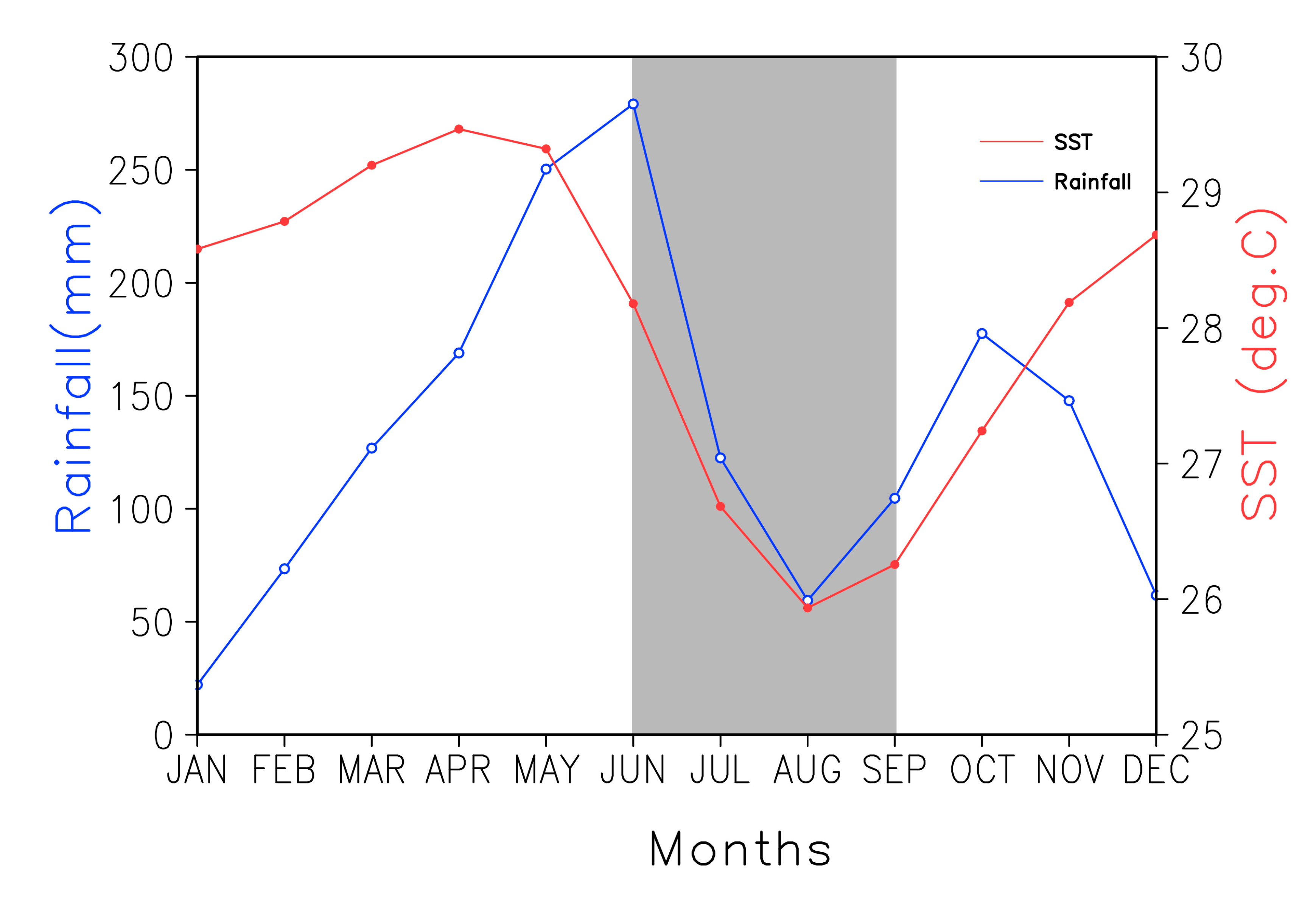
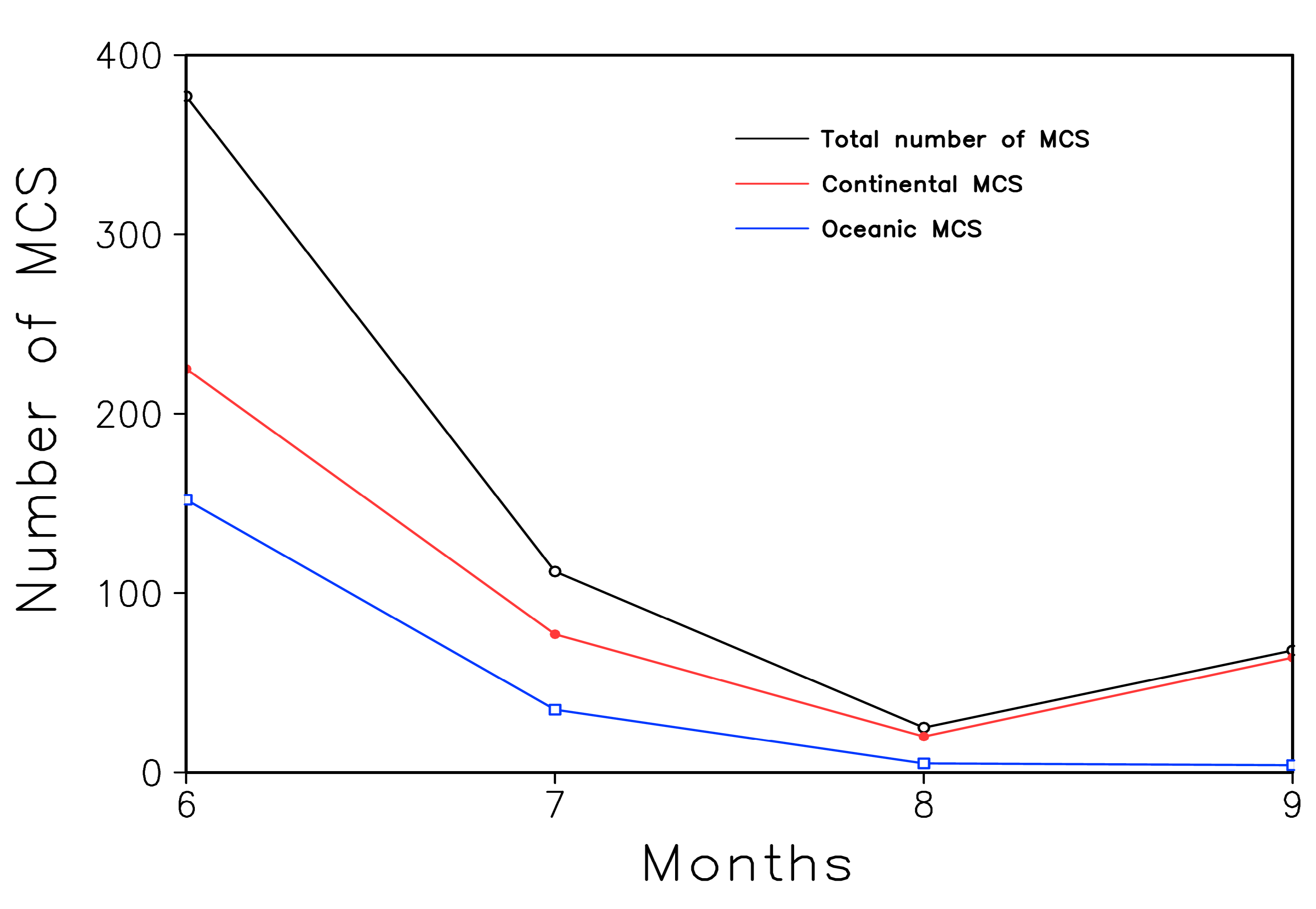
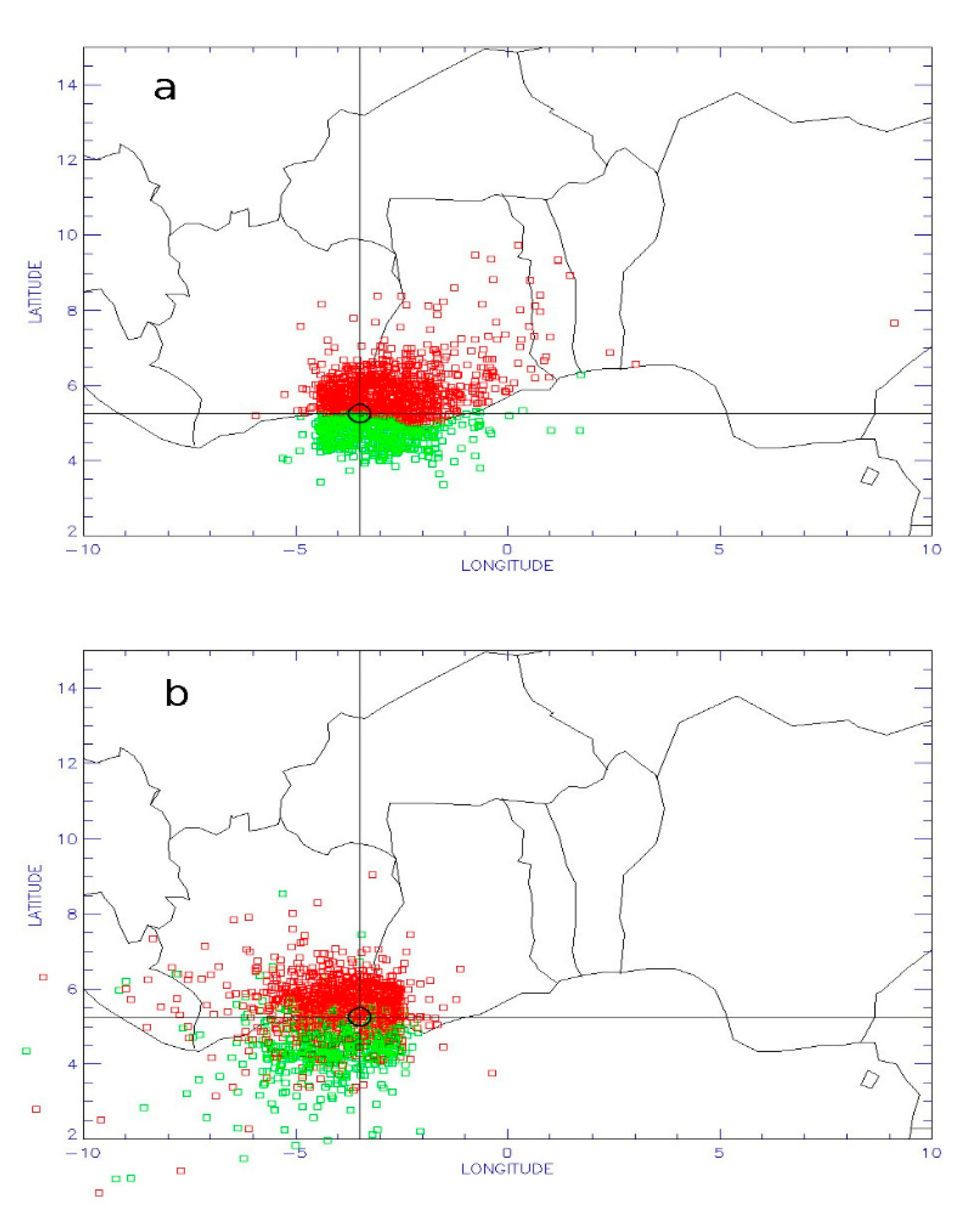
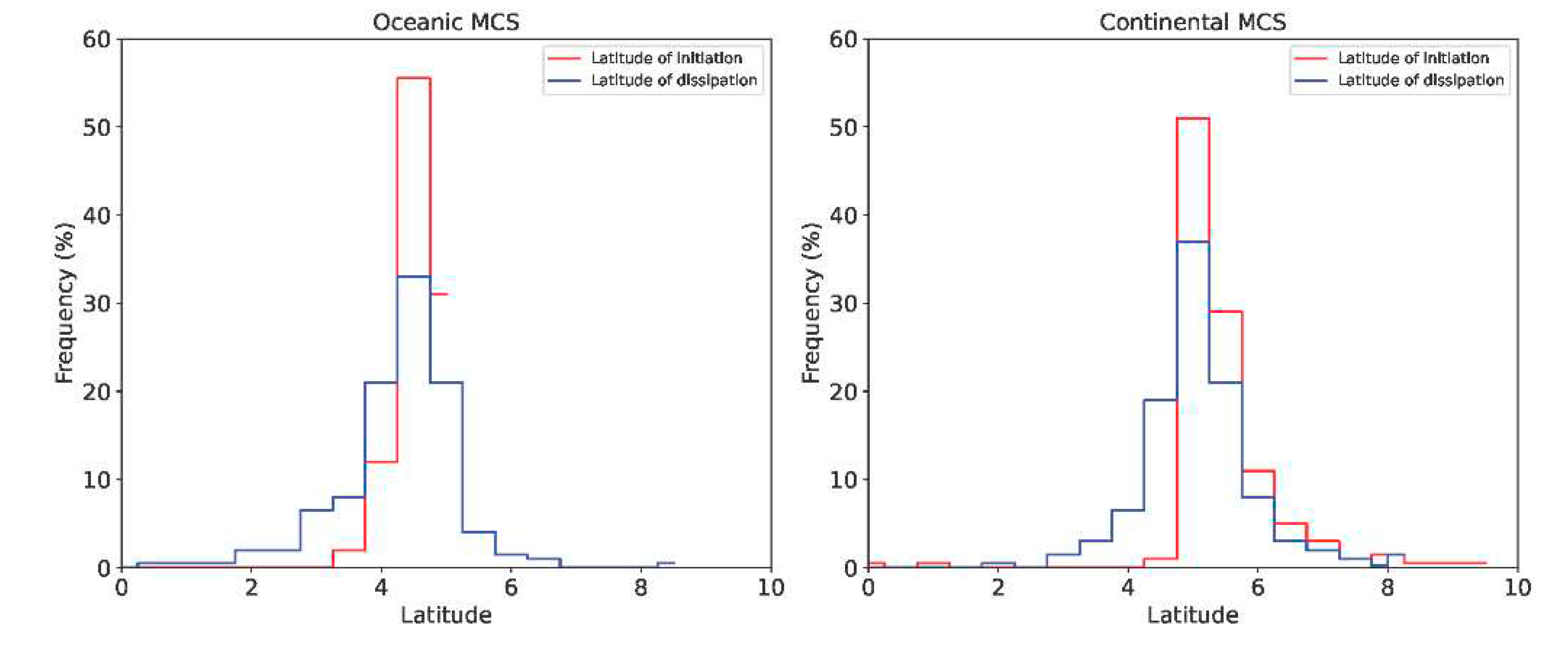
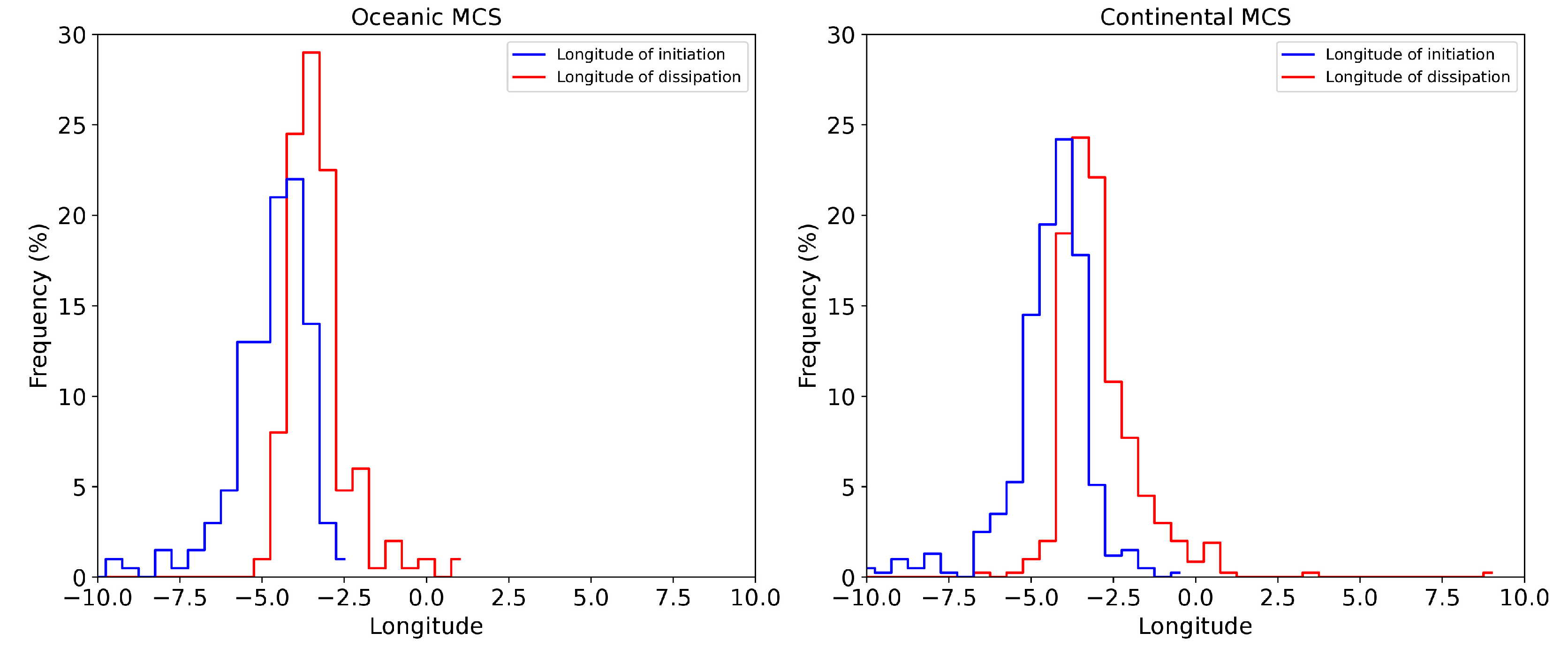
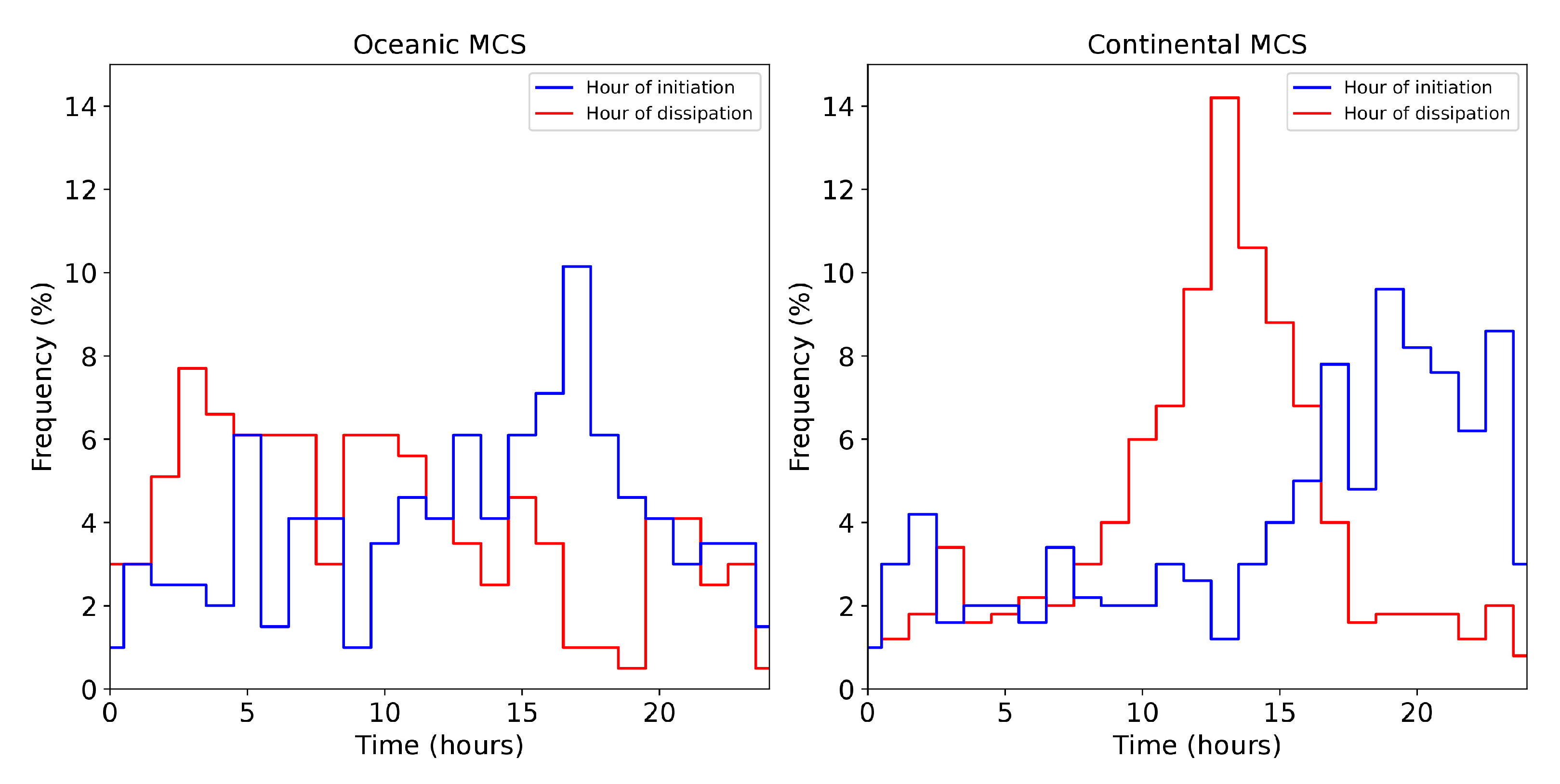
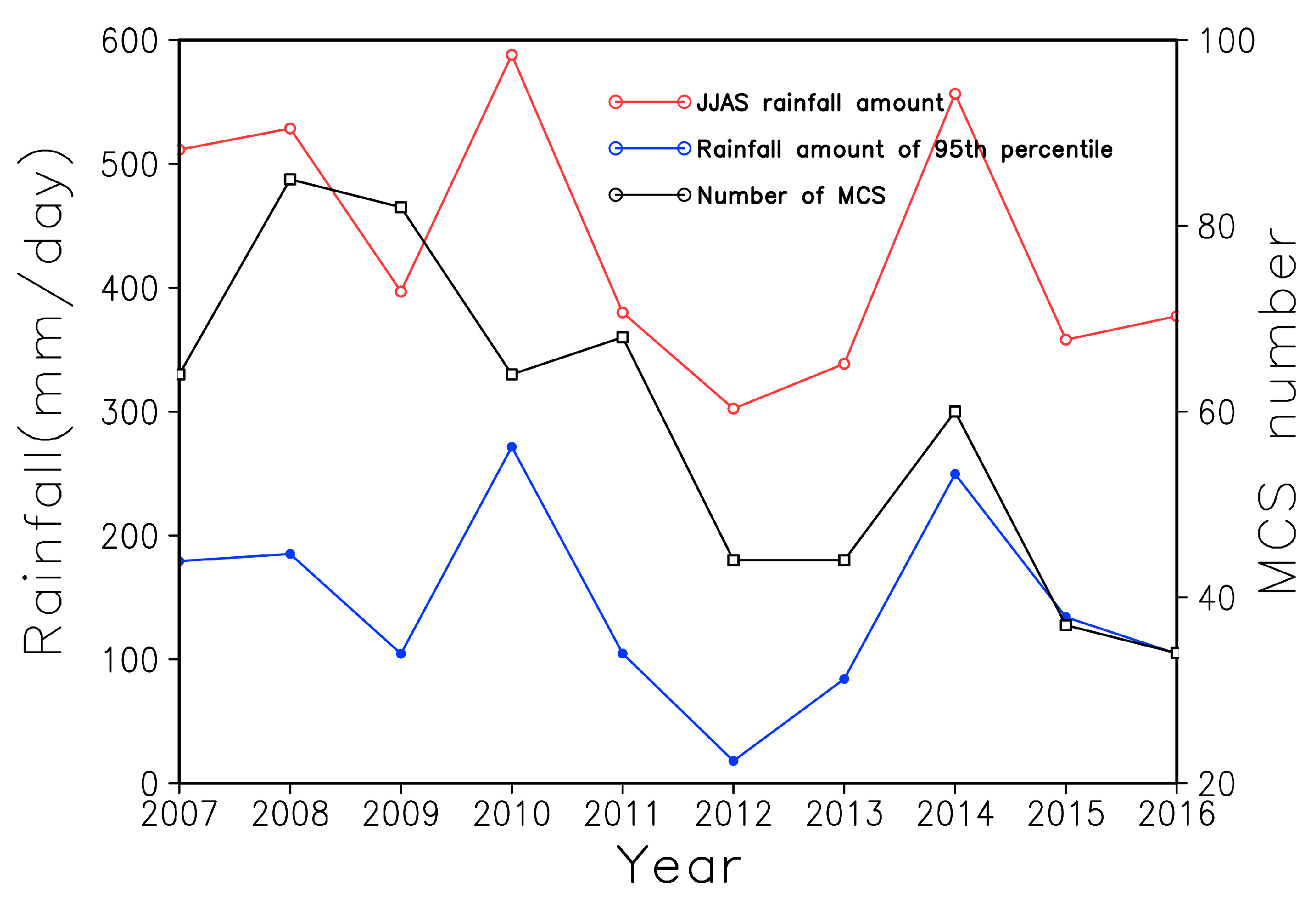
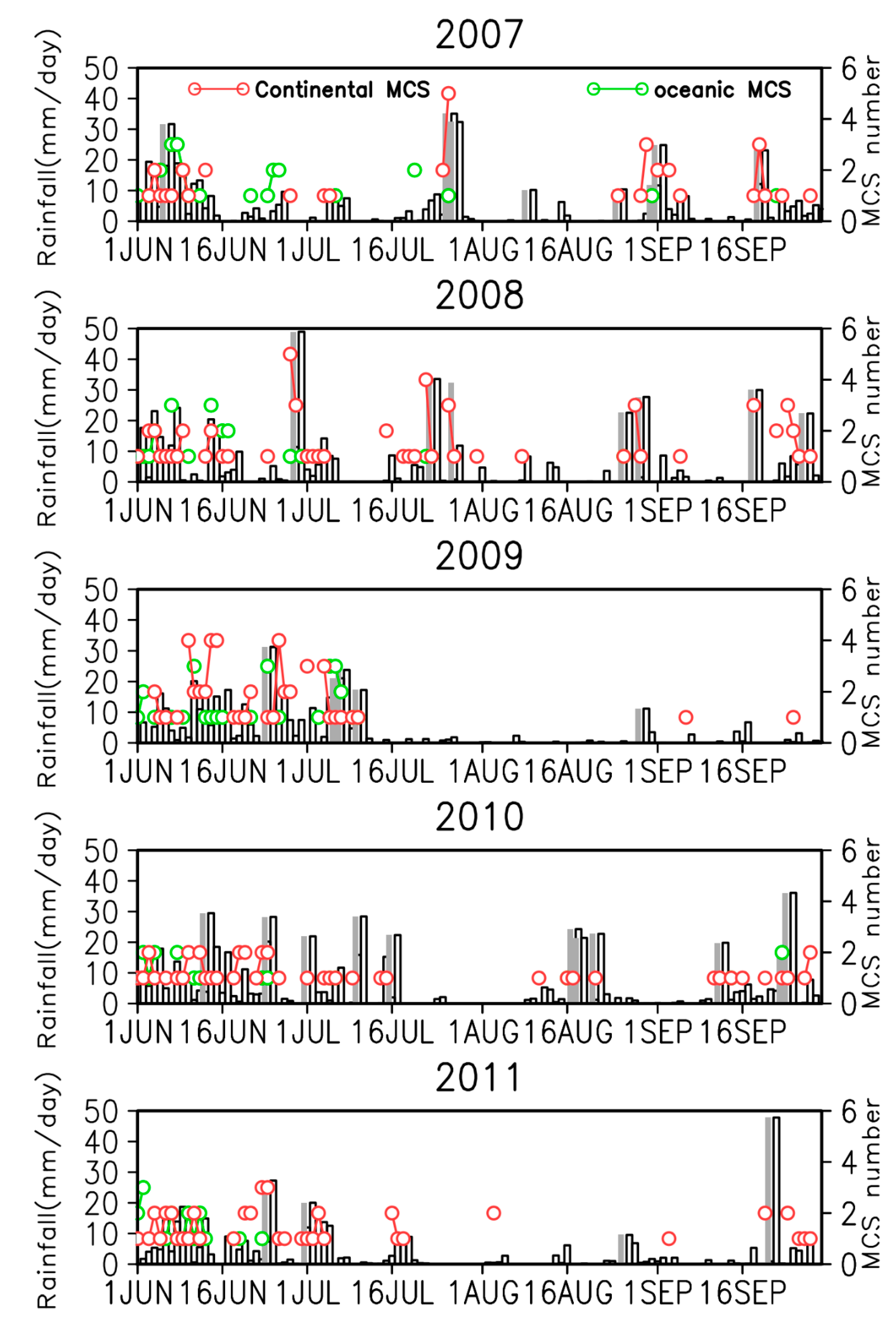
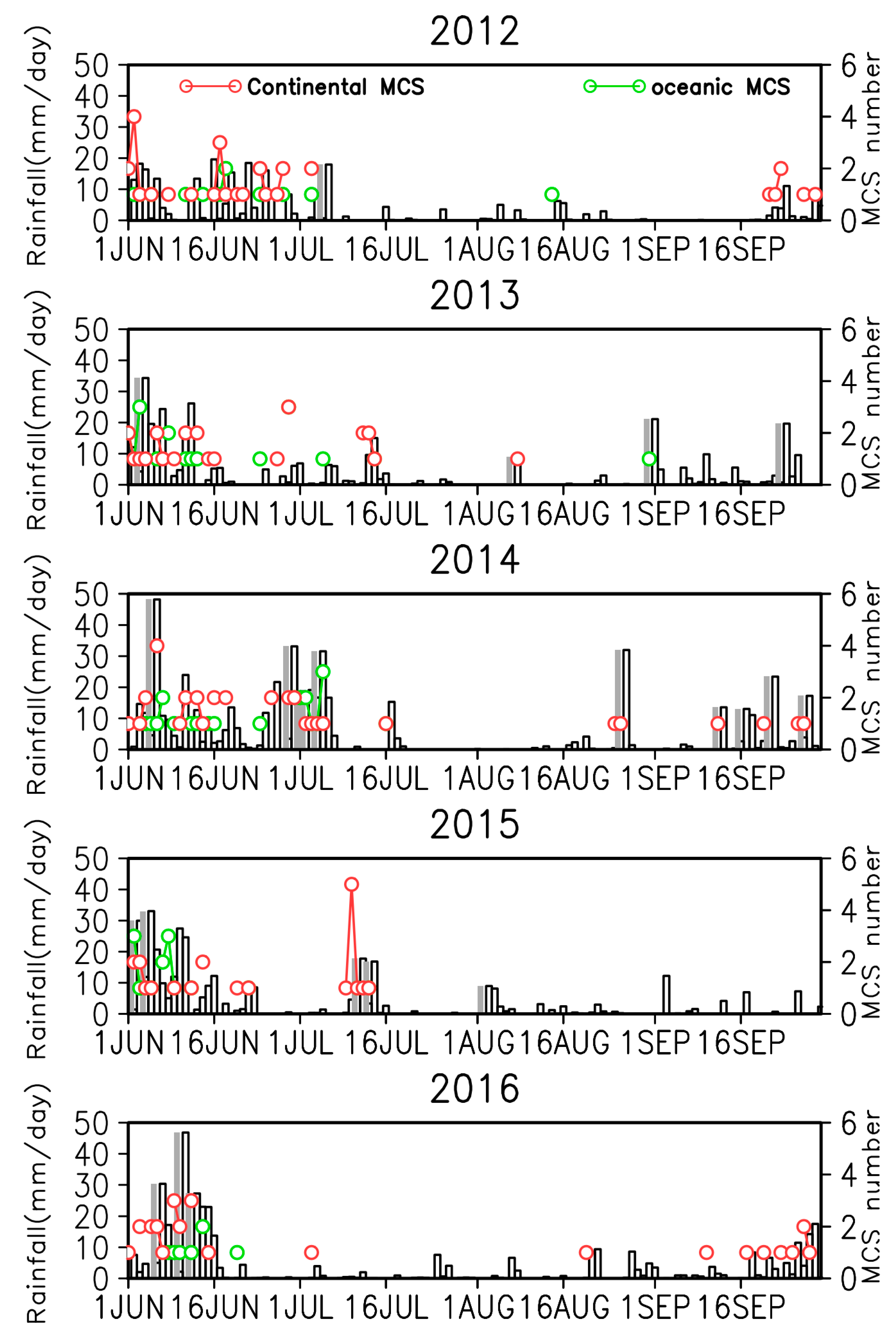
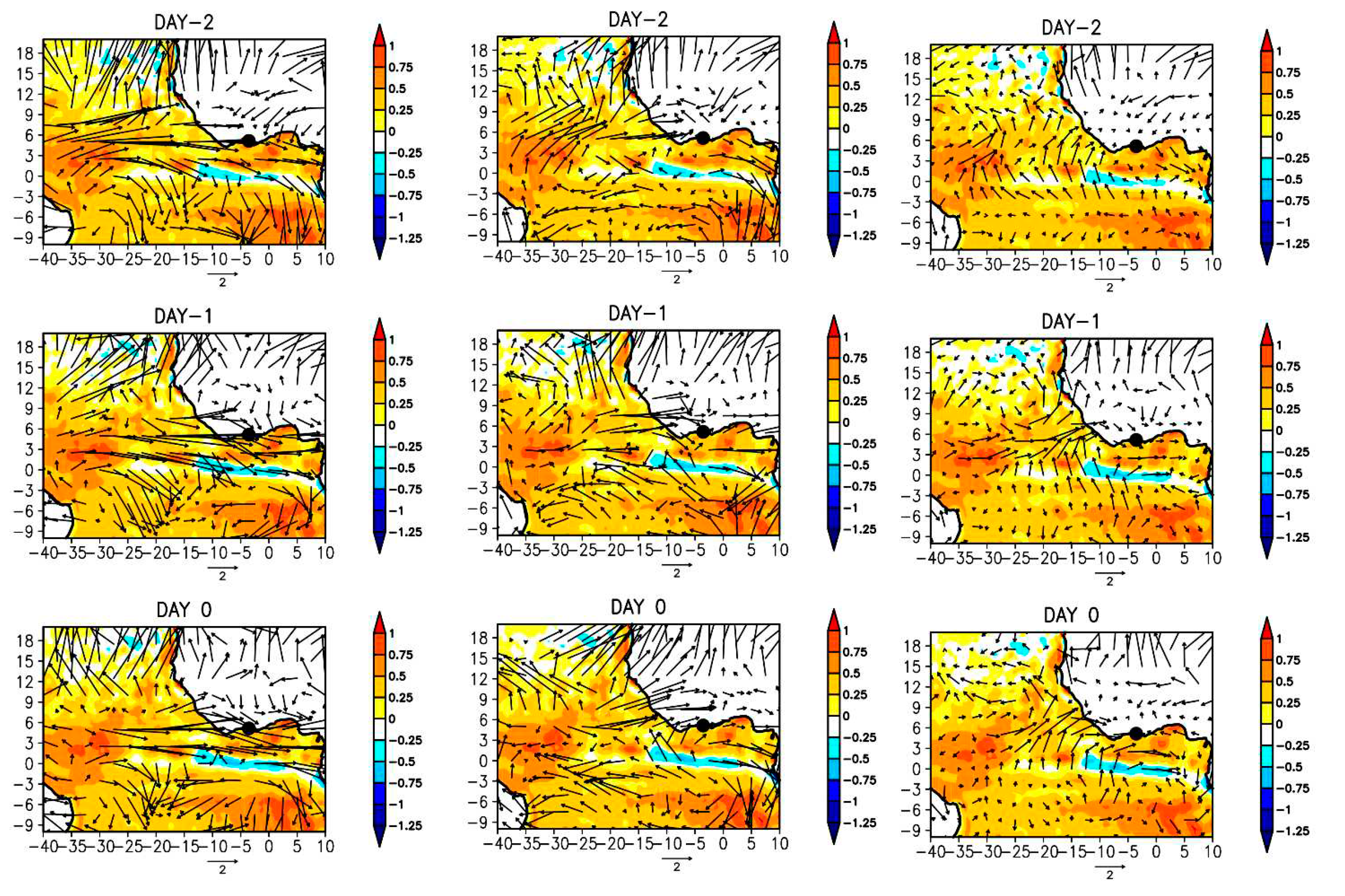
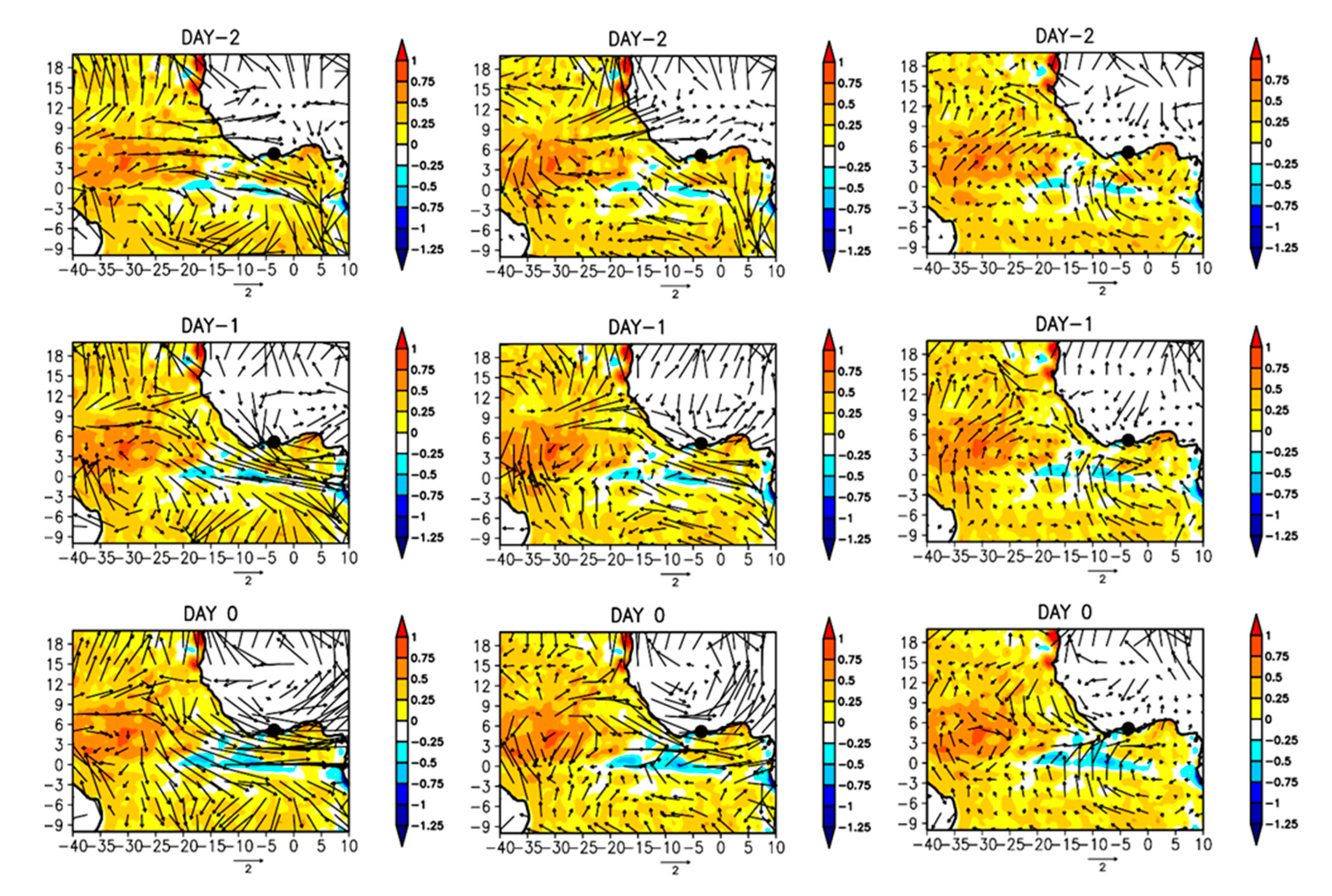
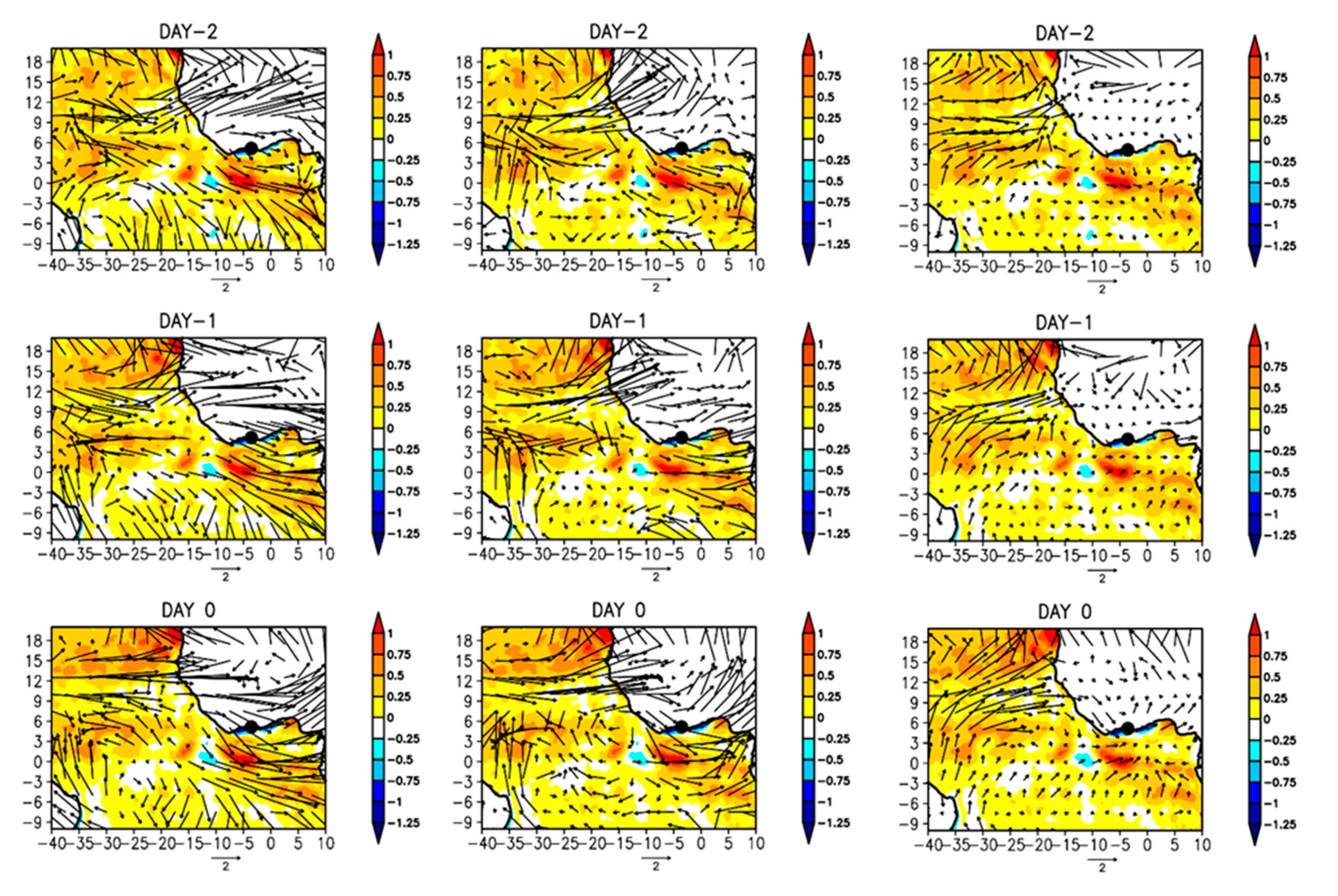
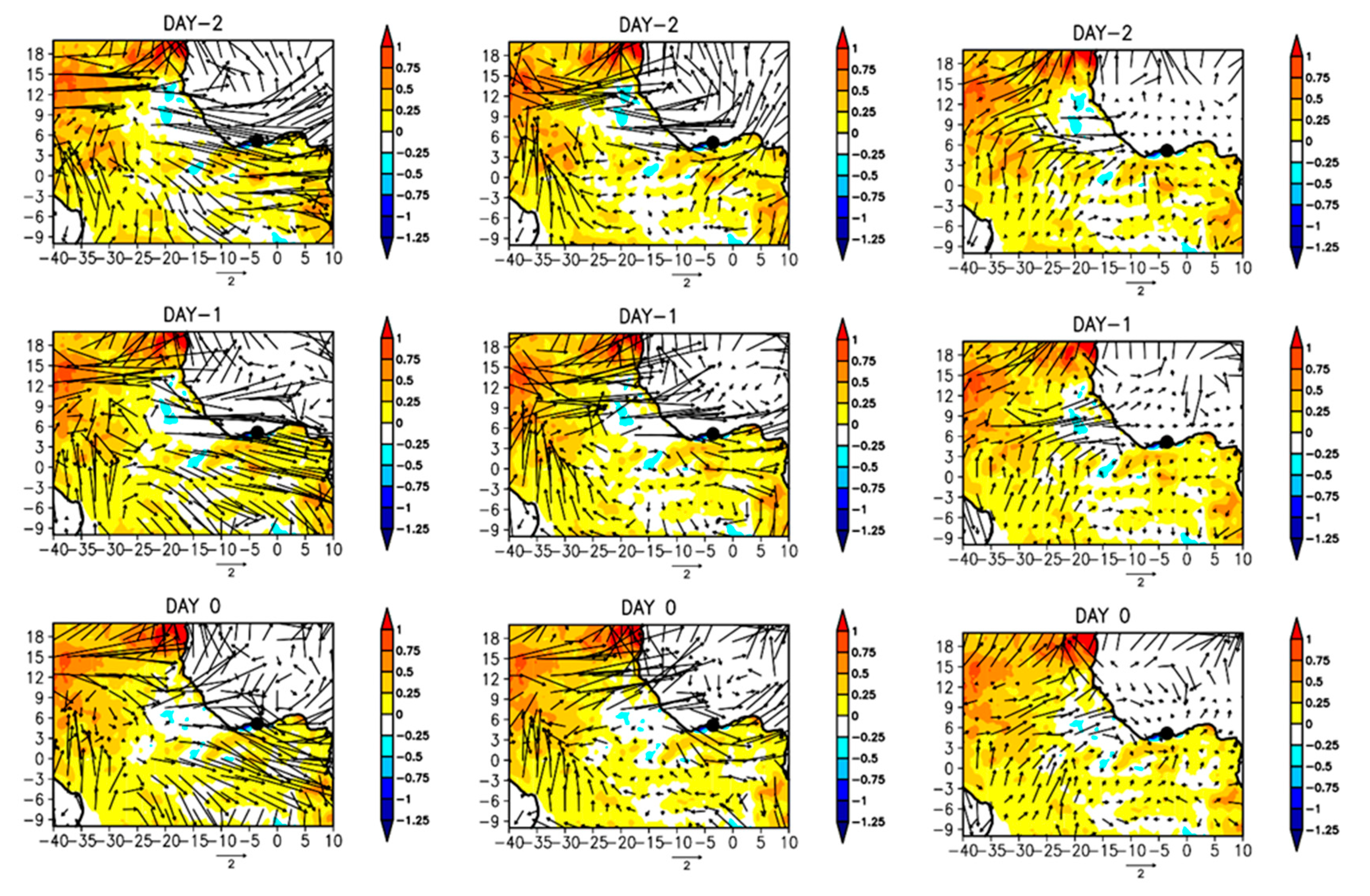
| Months | June | July | August | September |
| Threshold (mm) | 24.45 | 17.19 | 8.35 | 12.17 |
| Months | Total MCS | Continental MCS | Oceanic MCS |
|---|---|---|---|
| June | 377 (64.77 %) | 225 (38.66 %) | 152 (26.12 %) |
| July | 112 (19.24 %) | 77 (13.23 %) | 35 (6.01 %) |
| August | 25 (4.30 %) | 20 (3.44 %) | 5 (0.90 %) |
| September | 68 (11.66 %) | 64 (11.00 %) | 4 (0.69 %) |
| Total | 582 (100 %) | 386 (66.32 %) | 196 (33.68 %) |
Disclaimer/Publisher’s Note: The statements, opinions and data contained in all publications are solely those of the individual author(s) and contributor(s) and not of MDPI and/or the editor(s). MDPI and/or the editor(s) disclaim responsibility for any injury to people or property resulting from any ideas, methods, instructions or products referred to in the content. |
© 2023 by the authors. Licensee MDPI, Basel, Switzerland. This article is an open access article distributed under the terms and conditions of the Creative Commons Attribution (CC BY) license (http://creativecommons.org/licenses/by/4.0/).





